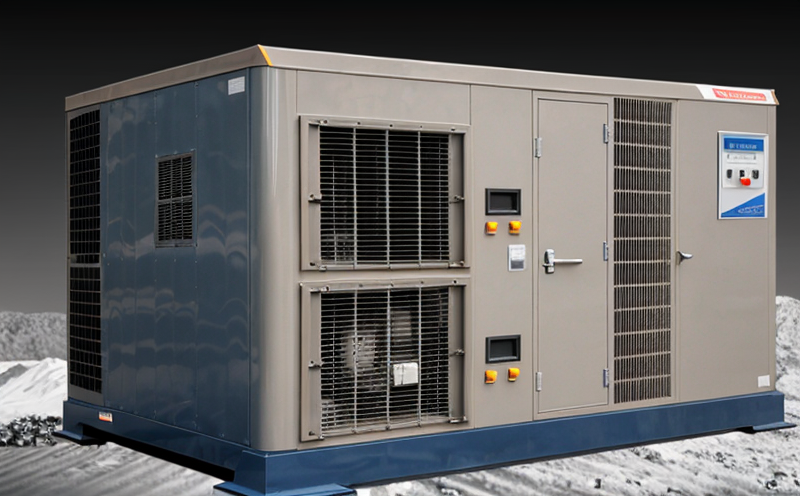JEDDEC JESD22-A136 Flip-Chip Thermal Reliability Testing
The JEDEC JESD22-A136 standard is a critical benchmark in the semiconductor industry, focusing on evaluating the thermal reliability of flip-chip packages. This testing procedure is essential for ensuring that electronic components can withstand extreme temperature variations without failure, which is crucial for their long-term performance and durability.
The process involves subjecting flip-chip devices to controlled cycles of heating and cooling to simulate real-world conditions encountered during manufacturing, transportation, and use. The goal is to identify potential weaknesses or vulnerabilities in the design that could lead to premature failures under actual operating conditions. This testing is particularly important for high-reliability applications such as automotive electronics, aerospace components, and medical devices.
The test setup typically includes a controlled environmental chamber capable of precise temperature regulation. During each cycle, the device undergoes rapid transitions between cold and hot temperatures. The duration and frequency of these cycles are defined by the standard to simulate different stress levels relevant to specific end-use applications. For instance, automotive-grade chips might experience more aggressive thermal cycling compared to consumer electronics.
Specimen preparation for JESD22-A136 involves ensuring that each flip-chip is securely mounted on a suitable carrier and connected properly before being introduced into the testing chamber. It's important to note that improper mounting can lead to inaccurate results, so this step must be meticulously executed by experienced technicians familiar with the nuances of semiconductor packaging.
The instrumentation used in JESD22-A136 includes advanced temperature sensors capable of detecting minute changes in ambient conditions within the chamber. These sensors are crucial for maintaining precise control over the thermal environment during testing, which directly impacts the accuracy and reliability of the results obtained. Additionally, data acquisition systems capture critical parameters such as peak temperatures reached by each device during a cycle, time spent above certain thresholds, and any anomalies detected throughout the process.
The acceptance criteria specified in JESD22-A136 are designed to ensure that only components capable of withstanding rigorous thermal stress pass muster. These criteria vary depending on the targeted application but generally include limits for maximum allowable temperature excursions during each cycle as well as overall exposure times. Compliance ensures manufacturers meet stringent quality control standards and contributes significantly towards enhancing brand reputation through consistent product reliability.
Compliance with JESD22-A136 is not merely an industry best practice; it has become a legal requirement in many jurisdictions for certain types of electronic devices intended for use in harsh environments. By adhering to this standard, organizations demonstrate their commitment to producing robust products that can perform reliably over extended periods without compromising safety or performance.
Understanding the significance of thermal reliability testing within semiconductor manufacturing helps companies make informed decisions about investing in appropriate resources and expertise necessary for successful implementation. Properly conducted tests not only protect against costly recalls but also foster trust among customers who rely on dependable technology solutions provided by reputable vendors.
Why It Matters
The importance of thermal reliability testing cannot be overstated, especially when considering the critical role that flip-chip packages play in modern electronics. These tiny yet complex components are integral to various industries ranging from consumer gadgets like smartphones and tablets to sophisticated systems used in space exploration missions.
- Enhanced Durability: By simulating real-world exposure scenarios, JESD22-A136 helps manufacturers identify weak points early in the development cycle. This allows for timely corrections before mass production begins, ultimately leading to more durable products that last longer and suffer fewer failures.
- Better Quality Control: Strict adherence to industry standards like JESD22-A136 ensures consistent quality across all units produced by different batches or suppliers. This consistency builds confidence among consumers knowing they are receiving high-quality goods.
- Risk Mitigation: Potential risks associated with poor thermal design are minimized through comprehensive testing according to established guidelines. This reduces the likelihood of unexpected failures that could result in significant financial losses due to downtime, warranty claims, or recall campaigns.
In summary, implementing JESD22-A136 thermal reliability testing is essential for maintaining competitive advantage while ensuring safety and compliance with regulatory requirements. It serves as a vital tool in the continuous improvement of semiconductor technology, contributing significantly towards advancing innovation within this rapidly evolving field.
Eurolab Advantages
At Eurolab, our commitment to excellence is reflected in every aspect of our services, including JEDEC JESD22-A136 flip-chip thermal reliability testing. Our team of highly skilled professionals combines decades of experience with cutting-edge technology to deliver unparalleled accuracy and consistency.
- State-of-the-art Facilities: Equipped with advanced environmental chambers capable of precise temperature control, our lab ensures that each test adheres strictly to specified parameters outlined in the JESD22-A136 standard. This guarantees reliable data collection and analysis.
- Experienced Technicians: Our staff comprises experts who possess deep knowledge about semiconductor packaging technologies and best practices for conducting thorough thermal stress assessments. They are well-versed in interpreting results accurately to provide valuable insights into product performance.
- Comprehensive Reporting: Beyond just generating test reports, we offer detailed explanations of findings along with recommendations based on our expertise. This holistic approach helps clients understand not only what their devices can endure but also how they might improve design for future generations.
We pride ourselves on offering a seamless experience from initial consultation through final delivery of results. Whether you're a small startup looking to validate new concepts or a large corporation seeking validation of established products, Eurolab stands ready to support your needs with robust capabilities and unwavering dedication.





